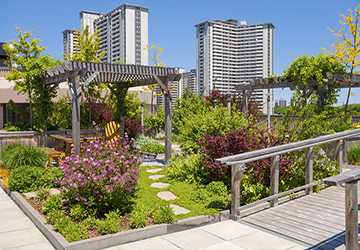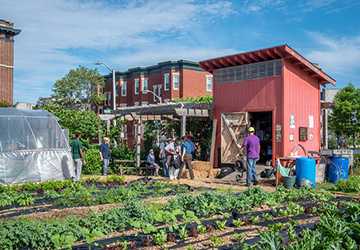How to Start a Sustainable Urban Garden
In the bustling rhythm of urban life, finding a slice of nature to call your own may seem like an impossible dream. However, the concrete jungles we navigate daily can transform into thriving green spaces with creativity, passion, and spartan wisdom. If you've been yearning to cultivate your sustainable urban garden but are still determining where to begin, fear not! This guide provides down-to-earth, practical tips to turn your urban space into a flourishing haven of greenery. So, grab your gardening gloves, and let's create a sustainable urban garden that nurtures plants and nourishes the soul.
In the bustling rhythm of urban life, finding a slice of nature to call your own may seem like an impossible dream. However, the concrete jungles we navigate daily can transform into thriving green spaces with creativity, passion, and spartan wisdom. If you've been yearning to cultivate your sustainable urban garden but are still determining where to begin, fear not! This guide provides down-to-earth, practical tips to turn your urban space into a flourishing haven of greenery. So, grab your gardening gloves, and let's create a sustainable urban garden that nurtures plants and nourishes the soul.

Choose the Right Plants for Your Space:
The first step in creating a thriving urban garden is selecting the right plants for your specific conditions. Take a good look at your space – consider the amount of sunlight it receives, the quality of the soil, and the available space. Opt for plants that thrive in your local climate and are well-suited for urban environments. If you have limited sunlight, go for shade-tolerant plants like ferns, mint, or lettuce. For those blessed with ample sunlight, tomatoes, peppers, and herbs like basil and rosemary are excellent choices. Additionally, consider the size of your containers or garden beds; compact plants like cherry tomatoes or dwarf varieties work well in confined spaces.
Embrace Sustainable Soil Practices:
Healthy soil is the foundation of a successful garden. Instead of relying on chemical fertilizers, opt for organic and sustainable soil practices. Start by enriching your soil with compost – it's like a superfood for plants! Composting kitchen scraps, leaves, and yard waste reduces your carbon footprint and provides nutrient-rich soil for your plants. Avoid synthetic pesticides and herbicides, as they can harm beneficial insects and disrupt the natural balance of your garden. Instead, explore natural alternatives like neem oil for pest control or companion planting, where certain plants deter pests from others. This spartan approach fosters a healthier garden and contributes to a more sustainable and eco-friendlier urban environment.
Conserve Water with Smart Irrigation:
Water can be a precious resource in an urban setting, so it's crucial to use it wisely. Implementing innovative irrigation practices conserves water and promotes a thriving garden. Consider installing a drip irrigation system or using soaker hoses to deliver water directly to the base of your plants. This reduces water wastage and ensures each plant gets the hydration it needs. Collecting rainwater is another sustainable way to irrigate your garden. Set up rain barrels to capture rainfall and use this natural water source to hydrate your plants during drier periods. It's a simple yet effective way to minimize environmental impact while keeping your garden lush and vibrant.
Practice Space-Efficient Gardening:
Urban spaces often come at a premium, so making the most of what you have is essential. Embrace space-efficient gardening techniques to maximize your green oasis. Vertical gardening, for example, allows you to grow plants upward, utilizing walls or hanging structures. This saves space and adds a visually appealing element to your garden. Container gardening is another space-saving option. Use pots, hanging baskets, or repurposed containers to grow your plants. This method allows easy mobility and lets you control your plants' soil quality and placement. Get creative with recycled materials like old buckets or wooden crates to give your garden a unique and sustainable touch.

Embrace Biodiversity:
Creating a diverse ecosystem in your urban garden enhances its aesthetic appeal and contributes to its overall health. Plant flowers by inviting beneficial insects like ladybugs, bees, and butterflies. These pollinators play a crucial role in the reproduction of many plants and contribute to a more resilient garden. Introduce companion plants that support each other's growth. For instance, planting marigolds alongside tomatoes can help deter harmful nematodes, while basil can enhance the flavour of tomatoes and protect against specific pests. Embracing biodiversity fosters a balanced and sustainable garden and reduces the need for chemical interventions.
Recycle and Upcycle for Garden Infrastructure:
Give your urban garden a sustainable edge by incorporating recycled or upcycled materials into its infrastructure. Instead of purchasing new planters, repurpose old buckets, tyres, or wooden pallets. Not only does this minimize waste, but it also adds a touch of creativity to your garden. Consider creating a compost bin using repurposed materials to recycle kitchen scraps and yard waste. This reduces your contribution to landfills and provides nutrient-rich compost for your plants. By recycling and upcycling in your garden, you're being environmentally conscious and adding a personal touch to your green space.
Educate Yourself on Local Regulations:
Before you dive headfirst into your urban gardening adventure, take the time to familiarize yourself with local regulations and guidelines. Some cities may restrict water usage, the types of plants allowed, or the use of certain gardening practices. Awareness of these regulations ensures that you cultivate a thriving garden and adhere to local rules. Additionally, connecting with local gardening communities or attending workshops can provide valuable insights into the specific challenges and opportunities of urban gardening in your area. Sharing knowledge and experiences with fellow gardeners can enhance your understanding of sustainable practices tailored to your unique urban environment.
Practice Mindful Consumption:
In the quest for a sustainable urban garden, you must be mindful of the resources you consume. Choose eco-friendly and locally sourced materials when purchasing gardening supplies. Opt for durable tools that can withstand the test of time rather than contributing to the cycle of constant replacements. Consider starting your garden from seeds or seedlings instead of buying mature plants. This reduces the environmental impact associated with transportation and allows you to witness the entire growth process. By practising mindful consumption, you contribute to a more sustainable urban gardening culture and make choices that align with a greener, healthier lifestyle.
Conclusion:
Starting a sustainable urban garden is an achievable and rewarding endeavour. You can cultivate a thriving garden in the city's heart by selecting the right plants, embracing sustainable soil practices, conserving water, and practising space-efficient gardening. Remember, gardening is a journey of learning and experimentation, so don't be afraid to get your hands dirty and enjoy the process. Happy gardening!